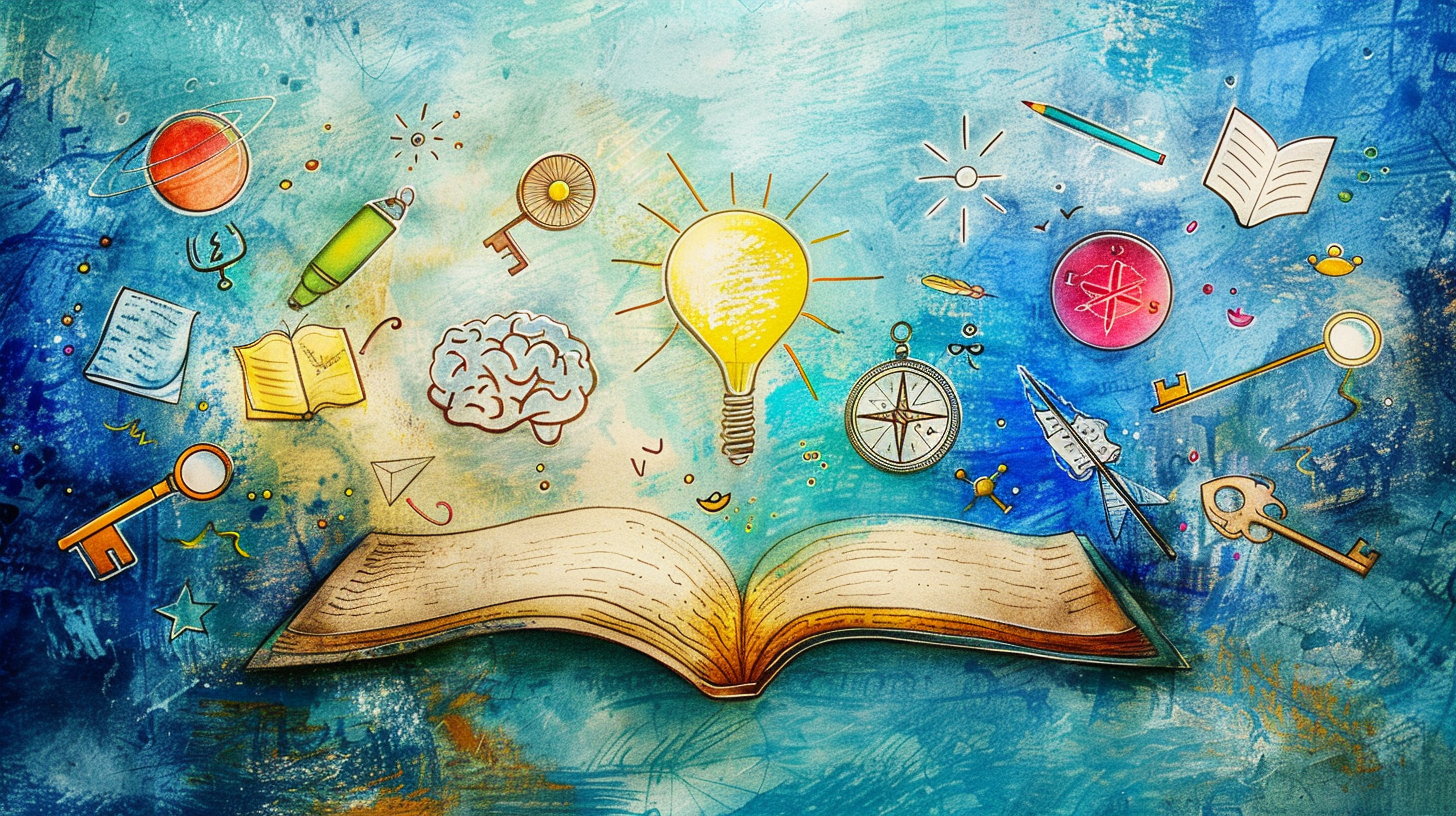Why are books important in our fast-paced digital world? Even with the surge of electronic media, books remain irreplaceable treasures that enrich our lives in myriad ways. They’re not just vessels of stories but powerful tools that can transform your thinking and open up new horizons.
In the upcoming sections, we’ll jump into the benefits of reading books, showcasing how they contribute to your personal development. You’ll also learn how books serve as guardians of cultural heritage and play a pivotal role in fostering human connections. Get ready to explore the profound impact books have on your life and the world at large.
Benefits of Reading Books
Source of Knowledge and Information
Reading books serves as a window to the world—a tool that enables you to tap into an expansive source of knowledge and information. You’re not just flipping through pages; you’re accessing the collective intelligence from various authors and thinkers. Audiobooks make this even more convenient, allowing you to soak in knowledge while on the go, transforming mundane tasks into opportunities for learning. This aspect underscores why books are important and how they can help shape your understanding of complex subjects.
Development of Critical Thinking Skills
Critical thinking is an invaluable skill in today’s world, and reading plays a pivotal role in its development. Analyzing plots, understanding characters’ motivations, and connecting literary themes—all these challenge your mind when you engage with books. Audiobooks encourage this mental exercise, too, letting you ponder on narrated stories and hypotheses, thereby enhancing your ability to think critically. This process exemplifies the importance of reading in fostering analytical skills beyond the written page.
Enhances Vocabulary and Language Skills
Diving into books is one of the most effective ways to enhance your vocabulary and language skills. You’re not just absorbing stories or information; you’re also exposed to new words, phrases, and styles of expression. Audiobooks pronounce these words for you, often with clear diction and accurate intonation, helping with pronunciation and language acquisition—key benefits of reading that bolster your communication skills.
Empathy and Emotional Intelligence
Why read books? For one, they’re powerful in building empathy and emotional intelligence. You vicariously live through characters’ experiences, which can help you understand and connect with the emotions of others in real life. Audiobooks can heighten this experience through the emotional delivery of the narrator, often evoking a more profound empathetic response as you listen to their voice convey the subtleties of human emotion.
Stress Reduction and Relaxation
One of the benefits of reading novels and other literature is its ability to reduce stress and promote relaxation. Engaging with a good book can transport you to another world, a respite from daily pressures. The convenience of audiobooks means that calming narratives are only a play button away, offering a form of auditory escapism that is both refreshing and rejuvenating—a perfect union of leisure and literature.
Entertainment and Escapism
Books have always been a source of entertainment, offering stories that ignite imagination and transport readers to different realms. Audiobooks elevate this form of escapism, bringing stories to life through compelling vocal performances, which can be more engaging for many compared to traditional reading. Whether you’re looking for a thrilling adventure, a heartwarming romance, or a mysterious crime tale, audiobooks deliver an enthralling experience that showcases why reading books is important for both pleasure and mental exploration.
Books as a Tool for Personal Development
Self-Reflection and Self-Awareness
Your journey through books fosters self-awareness, a key benefit of reading. As you investigate various narratives and perspectives, you’re not just absorbing content; you’re engaging in active self-reflection. This process helps you understand your beliefs, values, and emotional responses. Reading is a catalyst for personal growth, enabling you to identify areas in your life where change might be welcome. You’ll find that through the act of reading, your ability to introspect enhances, satisfying the human need for self-development.
Inspiration and Motivation
Stories of triumph, perseverance, and ingenuity are powerful stimulants that push you to overcome your challenges. When you listen to an audiobook detailing someone’s journey to success, it can ignite a fire within you. Books provide an intimate motivational boost because they connect you with the minds of great thinkers and achievers. You’re not only learning why reading is important, but you’re also discovering the purpose of these narratives—they act as a springboard for your aspirations and dreams.
Cultivating Creativity
Your creativity thrives when you’re exposed to the diverse worlds hidden within books. Imagination flourishes as you’re transported to different realms or confronted with unique ideas. Audiobooks, in particular, add an auditory layer to the storytelling, enhancing your imaginative experience. The pros of reading — or, in this case, listening — are evident as you find your thoughts enlivened and creative solutions to problems arise more naturally in your everyday life.
Improving Communication Skills
Absorbing the eloquence of a well-written book can sharpen your communication skills significantly. How does reading help you in this regard? By listening to complex characters and taking in the stylistic nuances of different authors, you internalize a range of expressions and vocabulary. This exposure is key to becoming a better communicator as it expands your understanding of language and helps you articulate your thoughts more clearly and effectively.
Building Empathy and Understanding
Books give you access to the inner workings of characters’ minds. This isn’t just about entertainment; it’s about understanding the human condition. Why are books important, particularly when it comes to empathy? They put you in someone else’s shoes, sometimes quite literally, through the immersive experience of an audiobook. By experiencing emotions and scenarios through the perspectives of characters, you cultivate a deeper sense of empathy, learning to connect with others’ feelings and backgrounds.
Engaging with books opens doors to new dimensions of personal development. The benefits of reading books — or listening to them — are vast, encompassing both emotional and intellectual growth. Let this be your invitation to discover the realm of books in all its forms, reaffirming why reading books is important for you and society at large.
Books as a Means of Cultural Preservation
Preserving History and Tradition
Books are fundamental in safeguarding the tales and teachings of bygone eras. Centuries-old manuscripts offer unparalleled insights into our predecessors’ lives, encapsulating historical milestones and social customs that continue to inform present-day values and norms. They hold the collective wisdom of societies, documenting their triumphs and blunders, ensuring that such knowledge persists beyond the lifespan of any individual. Through books, you can trace humanity’s narrative, honoring the rich heritage that shapes your worldview.
The act of reading connects you directly with authors long past, facilitating a form of conversation with those who have laid the foundations upon which modern society is built. Preservation is more than a duty; it’s the thread that weaves through the fabric of history, allowing you to comprehend the progress spanning generations. Be it ancient philosophies or ancestral folklore, books serve as the custodians of civilization, keeping the spirit of tradition alive for you and future cohorts.
Promoting Cultural Diversity and Inclusion
In an increasingly interconnected world, books emerge as powerful instruments for promoting cultural understanding and acceptance. They showcase the spectrum of human experience—every unique story propelling you into worlds dissimilar to your own. This exploration fosters empathy and opens doors to diverse ways of life, revealing how literature can play an influential role in building mutual respect across different cultures.
Why is reading good for you in this context? By engaging with a variety of perspectives, you naturally become more inclusive and receptive, celebrating differences as opposed to fearing them. Books often introduce you to languages, traditions, and perspectives you may never encounter firsthand, proving invaluable in creating a more inclusive society.
Creating Social Awareness
Reading encourages you to confront social issues, both past and present, through nuanced narratives that might not find space in mainstream discourse. Books illuminate the struggles and successes of marginalized communities, giving voice to those often silenced. They can also trigger important discussions about justice, equity, and reform, encouraging a collective examination of societal norms and advocating for change.
What are the benefits of reading in terms of social awareness? Whether it’s highlighting the impact of historical injustices or exploring current environmental dilemmas, books provide the backdrop for informed debate, nudging you towards a more active civic engagement. By exposing you to multifaceted human experiences, books serve not just as a reservoir of knowledge but also as a catalyst for societal progress.
Books as a Source of Human Connection
Creating a Bond between Authors and Readers
When you immerse yourself in an audiobook, you’re connecting directly with the author’s voice. The intimacy of hearing a story as it’s meant to be told fosters a unique bond between you and the writer. For authors, their words, the product of countless hours, become a bridge to you. It’s a personal relationship built on the foundation of shared experience, thoughts, and emotions. The importance of reading, or in this case listening, transcends mere information exchange; it becomes an invisible thread tying individuals across distances.
Promoting Discussion and Dialogue
Books, particularly audiobooks, open the door to rich dialogue and discussions. Listening to an audiobook can be a communal activity, leading to conversations with others who share your interests. Whether it’s a family listening together or an online book club, the benefits of reading books manifest in lively discussions, sparking new ideas and perspectives. As you engage in these dialogues, you’ll find that they deepen your understanding and appreciation of the material, proving that the act of listening is just as social as it is solitary.
Fostering Empathy and Understanding among Readers
One of the profound advantages of audiobooks is their ability to enrich your emotional intelligence. By experiencing stories through the nuanced narration of voice actors or the heartfelt inflection from the authors themselves, your capacity for empathy grows. You’re not just hearing a story; you’re living it. The characters’ joys and sorrows resonate on a deeper level. This is reading good for you: it allows you to walk in someone else’s shoes if only for a while, broadening your understanding and shaping a more empathetic worldview.
Conclusion
Books are your gateway to the deepest corners of knowledge and emotion, shaping your understanding of the world and yourself. They’re not just a pastime; they’re tools for lifelong learning and a bridge to human experiences far beyond your own. By turning pages, you’re turning the gears in your mind, developing a richer, more nuanced perspective.
Embrace the transformative power of reading and let books be your companions on the journey to personal and societal enlightenment. Remember, every book you read is a step towards a more informed, empathetic, and connected world. Keep reading, and keep growing.
Frequently Asked Questions
What are the purposes of reading for personal development?
Reading for personal development offers numerous benefits, such as enhancing self-awareness, fostering inspiration, cultivating creativity, improving communication skills, and building empathy.
How does reading contribute to personal growth?
Reading allows you to reflect on your own life, draw inspiration from different stories, and understand complex emotions and experiences, contributing to substantial personal growth.
What impact does reading have on creativity and communication?
Reading broadens your imagination and exposes you to different writing styles and narratives, which in turn can improve your own creative thinking and communication skills.
Can books promote cultural understanding and diversity?
Yes, books are a powerful means to preserve history, understand cultural heritage, and celebrate diversity, fostering a deeper understanding and empathy among readers from different backgrounds.
How do books help in creating social awareness?
Books shed light on societal issues, giving voice to marginalized groups and triggering important conversations, thus playing a crucial role in enhancing social awareness.
What unique relationship do audiobooks create between authors and readers?
Audiobooks can establish a personal connection through the author’s voice, making the experience intimate and often enhancing the bond between the author and the reader.
Why are books often considered more reliable than online information?
Books typically undergo extensive editing and fact-checking before publication, making them more reliable, whereas online information can be rapidly changed and may lack the same rigorous review process.




